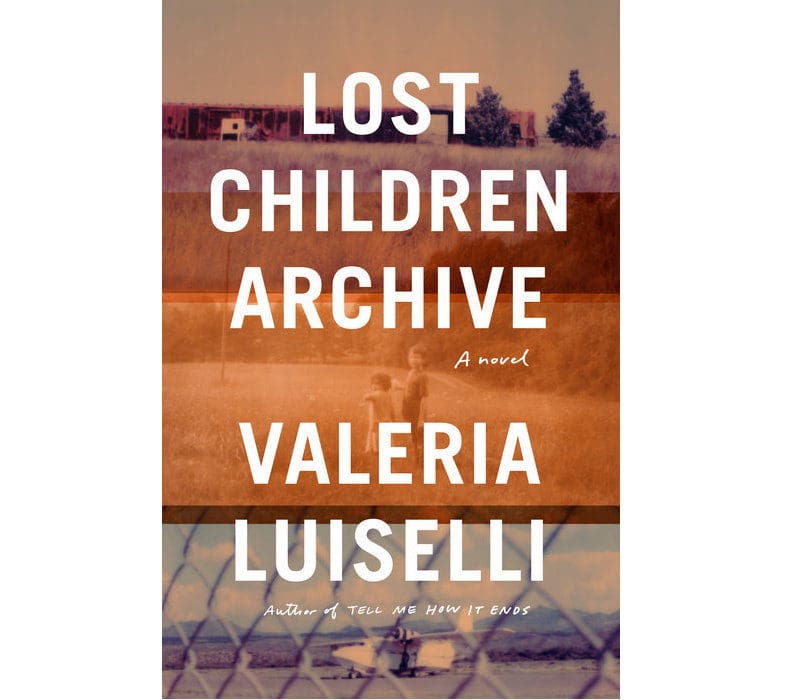“I kept having those sudden, subtle, and possibly microchemical raptures—little lights flickering deep inside the brain tissue—that some people experience when they finally find words for a very simple and yet till then utterly unspeakable feeling.” The words of Valeria Luiselli’s narrator, describing reading Sontag for the first time. Yes, yes, yes, I wrote in the margins. Not only on that page, but almost every other. I wrote down the microchemical raptures I was having, one after the next, from beginning to end of this revelatory novel.
I went into the reading of The Lost Children Archives already a fan of Lueselli’s work, having loved the innovation, humor, depth of thought, and just plain great writing evident throughout her essay collection, two novels, and last year’s gut punch of a long essay, Tell Me How it Ends: An Essay in Forty Questions, about her experience as a volunteer court translator for undocumented migrant children in New York and a road trip to the border she took with her children and husband, who was also born in Mexico. That same road trip inspired The Lost Children Archives, a semi-autobiographical gloss that Lueselli skillfully crafts without dipping into the pedantic accumulations that sometimes overwhelm such books.
The premise is simple: a woman and her husband, with their two children (the woman’s five-year-old daughter and the man’s ten-year-old son, both from previous marriages) drive from New York to the Dragoon Mountains in Southwest Arizona, where, in 1886, the Apache warrior Geronimo became one of the last major Native American leaders to surrender the US Army. The couple are collecting sounds along the way for two different projects. She describes herself as a documentarian, putting together recorded interviews to make sense of “this fucked up land,” while he is a documentarist, who records ambient sounds—wind, traffic, bird cries—to capture the atmosphere of certain places. They first met in New York, and collaborated on a four-year project there documenting the more than 800 languages found in the city. Now that their joint project is over, they must try to navigate their separate obsessions together: for her, the lost children of Central America fleeing on bestias (a nickname for the long, dangerous freight trains migrants hitch rides on), whose number includes the two daughters of a New York acquaintance whom the narrator has pledged to search for; for him, the legacy of Geronimo’s resistance to colonization.
This road novel is driven by fierce intelligence, and is very much in conversation with her artistic and intellectual forefathers and foremothers. These conversations are both direct and buried:
I know, as we drive through the long, lonely roads of this country—a landscape that I am seeing for the first time—that what I see is not quite what I see. What I see is what others have already documented: Ilf and Petrov, Robert Frank, Robert Adams, Walker Evans, Stephen Shore—the first road photographers and their pictures of road signs, stretches of vacant land, cars, motels, diners, industrial repetition, all the ruins of early capitalism now engulfed by future ruins of later capitalism. When I see the people of this country, their vitality, their decadence, their loneliness, their desperate togetherness, I see the gaze of Emmet Gowin, Larry Clark, and Nan Goldin.
There are echoes of the Odyssey, Ezra Pound’s Cantos, Virginia Woolf’s Mrs Dalloway, Joseph Conrad’s Heart of Darkness, and dozens of others, in multiple languages, plus numerous classic American road texts. These include, most explicitly, Jack Kerouac’s On the Road and Cormac McCarthy’s The Road, the latter of which is repeatedly invoked when the narrator clicks on her audiobook player, which autoplays the first line of the post-apocalyptic tale: “When he woke in the woods in the dark and the cold of the night he’d reach out to touch the child sleeping beside him.” Instead of continuing from there, the parents somewhat perversely decide to listen to William Golding narrate his novel Lord of the Flies instead.
She also quotes extensively from the fictive Elegies for Lost Children, which chronicles the bestia journeys of seven children, including two sisters who are very reminiscent of the narrator’s friend’s children.
Along the way, the narrator documents the enclosed ecosystem that exists within the car, the shared language, stories, jokes, nicknames, and collective myth-making that define the boundaries of a family, while also interrogating the utility of documentation and bearing witness, as well as the purpose of parenthood, identity, stories, myths, markers, and what can be done to save “this fucked up land.”
It is a breathtaking journey, one that builds slowly and confidently until you find yourself in a fever dream of convergences. The Lost Children Archive is simply stunning. It is a perfect intervention for our horrible time, but that fleeting concurrence is not why this book will be read and sampled and riffed on for years to come. Luiselli is swimming in the historical currents of the great stories and myths of journey and discovery that came before. She is also telling the American story. I don’t believe in “The Great American Novel,” the mostly masculinist and reductionist idea that one big, fat book can stand in for all of our country’s messy, contradictory experiences. The Lost Children Archive contains multitudes, contradictions, and raises difficult questions for which there are no easy answers. It is a great American novel. It is also a great human novel.

